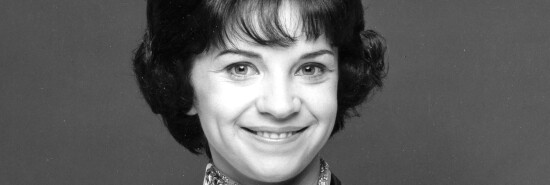
Cindy Williams, 1947-2023
Peter Tonguette
Many great actresses are notable for their elusiveness. Think of the enigmatic radiance of Greta Garbo or the ethereal fragility of Audrey Hepburn.
Less often commented upon are those performers who make their mark by being agreeable, approachable, and companionable. Foremost among their ranks is Cindy Williams, who has come down through the decades as perhaps America’s most adorable actress.
Whether on the sitcom Laverne & Shirley or in the classic film American Graffiti, Williams, who died on Jan. 25 at age 75, was the modern personification of the girl next door: sweet-natured, calm-voiced, button-nosed, utterly endearing.
Like her more honored, more famous contemporaries Sally Field (with whom she shared roots on episodic television) and Goldie Hawn (with whom she had in common a knack for kooky comedy), Williams had the enviable quality of relatability: Women could imagine being her pal; men could bring her home to Mom.
The daughter of Beachard and Francesca Williams, Cynthia Jane Williams benefited from being raised both close to, and far from, Hollywood: Although she was born in Van Nuys, California, she spent much of the first decade of her life in Dallas. “I consider myself a Texas girl,” said Williams in an interview with the Archive of American Television. At age 10, though, the family headed back to California — a fortuitous move for a child increasingly smitten with the small screen.
“I loved television,” Williams said. “My grandmother had the first TV on the block, and I watched it from the time I can remember, four or five years old. … I became the characters in those stories, and that was basically my big interest as a child.”
An eager participant in talent shows as a youth, Williams tried her hand at acting in high school and studied theater arts at Los Angeles City College. In time, her innate winsomeness landed her bit parts in such series as Room 222 and Barefoot in the Park and a series of B movies, including Roger Corman’s Gas!, Or It Became Necessary to Destroy the World in Order to Save It (1970) and the horror sequel Beware! The Blob (1972).
These credits were mostly disposable, but Williams’s appearance in Jack Nicholson’s first directorial feature, the intriguing college basketball drama Drive, He Said (1971), forecast the direction of her career.
First came American Graffiti in 1973. In George Lucas’s crazy quilt coming-of-age portrait, Williams played Laurie, the pretty, sensible girlfriend of Steve (Ron Howard). Although the film was about the life-altering choices one makes at the tail end of adolescence, Laurie represented an appealing stability and stolidity; it’s no surprise that she stands with Steve at the end of the film as they wave so long to wandering Richard Dreyfus. The following year, Francis Ford Coppola cast Williams in his masterly paranoid thriller The Conversation.
These roles, however, were merely a prelude to what became her signature part, Shirley Feeney in Laverne & Shirley. Williams and Penny Marshall, co-starring as Laverne DeFazio, test-piloted their roles on Happy Days, for which they were rewarded with a series that ran from 1976 to 1983. Although Laverne’s trenchant sarcasm will always generate more guffaws, Shirley’s more basic hopes and fears have proven more appealing over the long haul. “She was sort of an optimist, kind-hearted, repressed, temperamental, fun-loving person who loved animals and believed in God but always had the wolf nipping at her heels,” Williams said to the Archive of American Television.
After departing Laverne & Shirley a season before the show itself wrapped up — a matter of controversy at the time since the actress was pregnant and contended that the network was making unrealistic demands of her — Williams struggled to find her footing, but good directors still gravitated toward her: John Binder cast her in the underrated comedy UFOria (1984), and New Hollywood survivor Matthew Robbins found a part for her in Bingo (1991), a dog comedy.
As she navigated the career prospects for an aging ingenue — turning up in 7th Heaven and 8 Simple Rules — one imagines Williams tackling each job with the same earnest pluck as Shirley. She wrote a good memoir, Shirley, I Jest!, in 2015. From her early days, there remain films to rediscover; she’s an enchanting hippie in legendary director George Cukor’s comedy-drama Travels With My Aunt (1972).
A genuine charmer has left our midst.
Peter Tonguette is a contributing writer to the Washington Examiner magazine.
